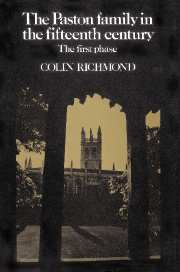Book contents
- Frontmatter
- Contents
- List of genealogical tables
- Preface
- Acknowledgements
- List of abbreviations
- Chronological table
- 1 The origins of the Pastons
- 2 Land: acquisition and defence
- 3 East Beckham
- 4 Three marriages
- 5 Relations: the Garneys and the Berneys
- 6 The deathbed of William Paston and its consequences
- 7 Sir John Fastolf and John Paston
- Conclusion
- Index
Preface
Published online by Cambridge University Press: 26 December 2009
- Frontmatter
- Contents
- List of genealogical tables
- Preface
- Acknowledgements
- List of abbreviations
- Chronological table
- 1 The origins of the Pastons
- 2 Land: acquisition and defence
- 3 East Beckham
- 4 Three marriages
- 5 Relations: the Garneys and the Berneys
- 6 The deathbed of William Paston and its consequences
- 7 Sir John Fastolf and John Paston
- Conclusion
- Index
Summary
‘I found myself liking at least two tracks of “Miles in the Sky”, not as jazz, but as a kind of soundtrack to some bleak pastoral such as a film of the Paston Letters.’ Philip Larkin mistakes the timeless attraction of the Paston Letters as surely as he does the enduring appeal of Miles Davis. From Horace Walpole's day until our own the letters have been read as much for pleasure as for profit. I find it difficult to distinguish between the two: my failure to do so has determined the nature of this book. It is written in what Ulrich Zwingli called Geschichteswyss – in a narrative fashion – and deliberately so. It has been said that analysis is a ‘non-doing’, that it is an alternative to action. In our society there is an analytical mania: as men, women, and children were dying on the terraces at Hillsborough so-called experts were analysing why they were. Also (it has been said) the analytical spirit obstructs enjoyment: the historian resembles the beadle of Rouen cathedral in Madame Bovary. My resolution was to avoid a joyless (and frustrating) examination of fifteenth-century specimens. What I resolved upon was a Shandean book: ‘Could a historiographer drive on his history as a muleteer drives on his mule, straight forward … but the thing is, morally speaking, impossible.’ Besides, there is no delight in the direct route.
- Type
- Chapter
- Information
- The Paston Family in the Fifteenth Century , pp. ix - xiiPublisher: Cambridge University PressPrint publication year: 1990



